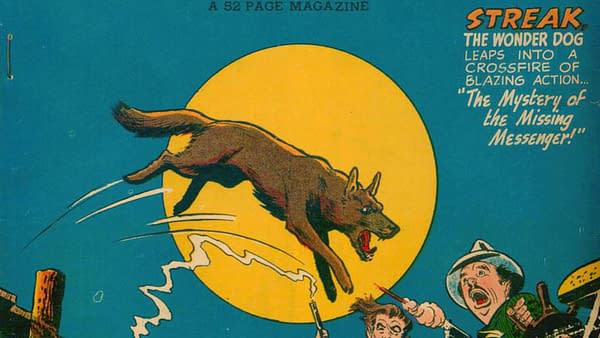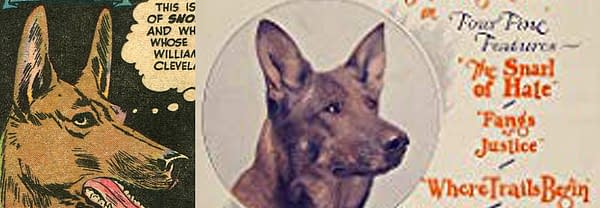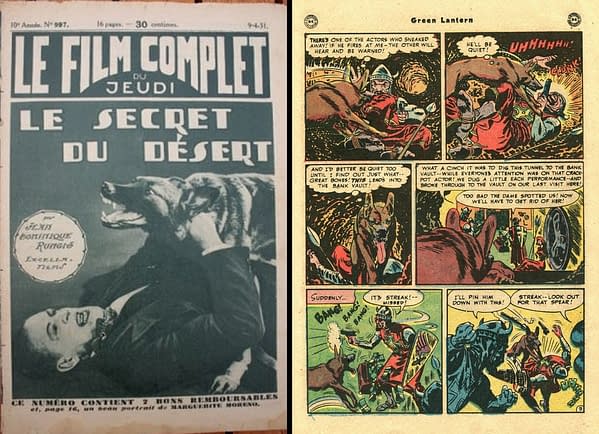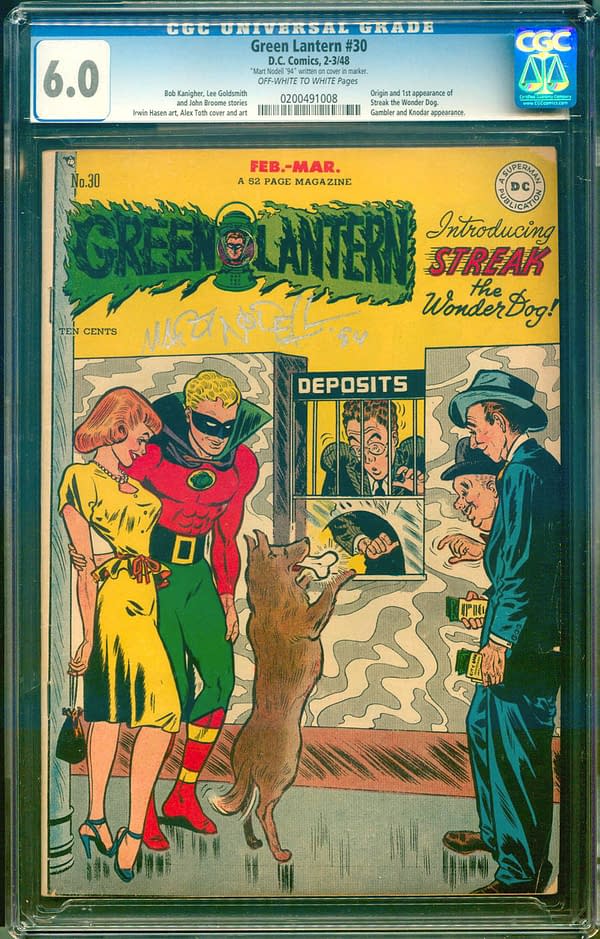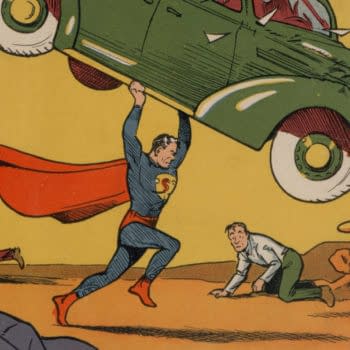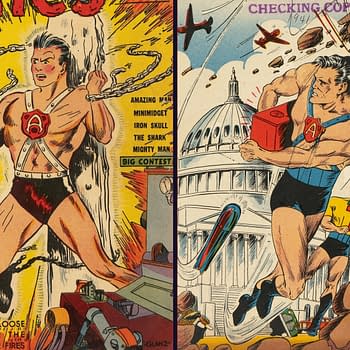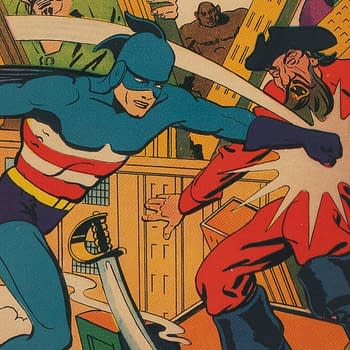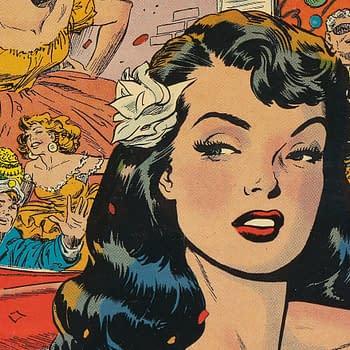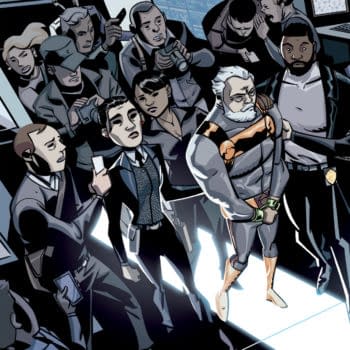Posted in: Comic Connect Sponsored, Comics, Vintage Paper | Tagged: green lantern, rex the wonder dog, streak the wonder dog
DogStars: The Strange, Secret Origin of the Dogs Who Replaced Green Lantern
Never take a fictional dog's origin story at face value. Dogs really do have secret lives, it seems, and every time I'm tempted to forget about the scattered notes I've taken over the years regarding fictional and sometimes forgotten dog stars of long ago, I think about how many billions of dollars that the concept of sharing pet photos has added to the market caps of the social internet companies, and add a few more notes to the file. It's probably worth setting a few of these things straight, sooner or later.
The origin of canonical dog star Toto of Wizard of Oz fame is a particularly egregious example of a lost chapter in the history of dog fiction. L. Frank Baum seems to have been substantially inspired, to put it politely, by at least one previous fictional pooch who looks the same, has a similar background, and is also named Toto.
We'll get to that prior pup called Toto another time, because tonite's Comic Connect auction session which includes a nice little run of Golden Age Green Lantern reminds me of the true story behind Streak the Wonder Dog. Streak is not to be confused with DC's other Wonder Dogs, but we will get to the Rex connection shortly.
Streak appears to be at least in part inspired by the forgotten film dog star of the 1920s and 1930s, Silver Streak the Wonder Dog. Movie star Silver Streak was a brown colored German Shepherd with a very similar appearance to his comic book counterpart. While some other dog stars are often played for comedy, both Streak and Silver Streak were also sometimes depicted to be very aggressive in pursuit of comic book and film justice. Film titles like The Snarl of Hate and Fangs of Justice set the tone for the original Silver Streak's adventures.
Streak debuted in Green Lantern #30 in early 1948, and by the time the title had run its course and ended in 1949, Streak was the dominant figure on most of the covers, and even had his own solo feature in the title. Then in 1952, the team who had created Streak the Wonder Dog in Green Lantern — Bob Kanigher and Alex Toth — rebooted their comic book pup for the post-superhero era into a white-furred former military K-9 Corps German Shepherd called Rex the Wonder Dog. Rex had his own series, which lasted for 46 bi-monthly issues through 1959.
Most accounts of Rex's backstory note that he's a rebooted version of Streak and also point out the similarity to a dog star of the film era of the 1920s. In total, this earlier movie dog star Rex appeared in about 28 films 1923-1930, and went on to become a performer in circuses, county fairs, and the like. When this Rex died in 1946, it was noted in newspapers across the country. Since "Rex" was a very popular name for dogs for many decades, and there's been more than one famous dog star named Rex besides that, the history of Rex the Wonder Dog has largely been left at that.
Except… then there's this little mystery.
A small group of newspaper accounts in 1958 put a spotlight on a 'new' Rex the Wonder Dog. Some of these accounts claim that it was this Rex that actually inspired the DC Comics series. What's more, in addition to film and tv work, the new Rex the Wonder Dog actually appeared with Superman on some sort of traveling show tour which involved George Reeves as Superman — the star of the Adventures of Superman television series — and actor/stuntman Gene LaBelle, playing a character called "Mr. Kryptonite". The connection between this Rex and the comic book version seems to have been confirmed in a 1985 Gannett News Service syndicated story on the 50th Anniversary of DC Comics. The widely-seen piece notes that DC turned to comics featuring celebrities in the 1950s, including "Bob Hope, Jerry Lewis, Rex the Wonder Dog and Hopalong Cassidy."
One of those 1958 stories about Rex also claims that he had just appeared in a 1958 episode of the Adventures of Superman television show. As far as I can tell, this episode never made it past the planning stages, if it was in the works. Of course, Superman actor George Reeves was found dead from a gunshot wound to the head in June 1959. Police ruled the matter a suicide, but the tragedy has been the subject of much speculation in the decades since.
Meanwhile, the story of the new Rex the Wonder Dog, while certainly unrelated to that tragic matter, remains no less of a mystery. A deep-dive piece on Rex in the January 29, 1958 issue of the Ithaca Journal (Ithaca, New York) headlined "Courageous Dog Outwits Reds, Reaches America" goes all in on what seems to be the hero dog's dramatic real-life story. When the Hungarian Revolution broke out in late 1956, Rex helped 25 Hungarians evade Russian patrols as they all made their way to freedom. Rex, four years old in 1958, had recently made his way to America from his birth home in Hungary:
The crossing was made at night with Rex in the lead. Once on the Austrian side of the border, the refugees lighted their flashlights — only to draw gunfire from the Communists they had outwitted.
Shortly afterward, two men approached Bihari (Rex's owner) and urged him to bring Rex back into Hungary to lead another party to safety. But their poor Hungarian speech and their manner did not ring true. Bihari, suspecting them of being Communist agents, turned down the opportunity for Rex to become a dubious hero.
Although it had been considered dangerous to bring a dog on such a venture, Bihari learned that groups of refugees on either side of them had been discovered, captured, and shot. Without Rex, Bihari feels, there would be no story to tell, no promising career in the United States.
Interestingly, the details here generally track with the comic book origin of Rex from The Adventures of Rex the Wonder Dog #1 in 1952, which briefly explain that Rex had been "overseas", had been awarded a medal for bravery, and had been trained to help people in trouble.
However, the Ithaca Journal story also contradicts the notion that this Rex inspired the comic book, since it launched in 1952, and Rex didn't arrive in the U.S. until 1957. Further, the "original" Rex passed away in 1946, so it's unlikely that he would've been part of a 1950s DC Comics push for celebrity or tv/film property-related comic books.
All of which means little, I suppose. More likely than not, Rex's backstory was crafted as part of some sort of Cold War era anti-Communist propaganda. It's even possible they intentionally borrowed elements of the comic book, given the loose link to the Superman television series.
Despite the arrival of the new Rex to America and a wide range of media and local event performances, The Adventures of Rex the Wonder Dog series ended in 1959. The day of the dog stars was in decline, and it was time for the superheroes again.
The same month that the last issue of The Adventures of Rex the Wonder Dog hit the newsstand, Green Lantern returned in Showcase #22.



